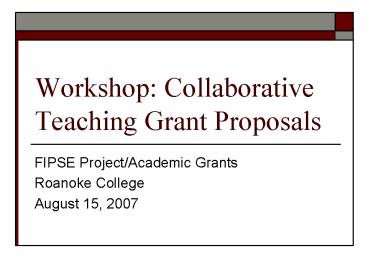Workshop: Collaborative Teaching Grant Proposals - PowerPoint PPT Presentation
1 / 16
Title:
Workshop: Collaborative Teaching Grant Proposals
Description:
... Washington, Providence College's research. Possible ... Integrated lecture series one or more instructors plan(s) course with guest faculty presenters ... – PowerPoint PPT presentation
Number of Views:23
Avg rating:3.0/5.0
Title: Workshop: Collaborative Teaching Grant Proposals
1
Workshop Collaborative Teaching Grant Proposals
- FIPSE Project/Academic Grants
- Roanoke College
- August 15, 2007
2
What Is Integrative Learning?
- A working definition for RC
- A system of learning that deliberately makes
connections between classes, fields, and academic
and co-curricular life, with the end goal being
the development of students who can encounter new
challenges and new knowledge in a productive
manner.
3
From the FIPSE Grant Proposal
- designing an integrative curriculum is not
enough. A curriculum that leads students to
understand the actual complexity of the work
world can only succeed in an environment where
faculty interaction across disciplinary lines is
deliberate and easily sustainable - Need faculty development that targets not
only what we teachthe dotsbut the connections
between those dots.
4
Collaborative Teaching Grants (CTGs)
- Voluntary participation of interested faculty
- An invitation to be creative, to pilot
experimental course models - Modeled after successful FSLC and WIG programs
- A year of preparation and development with
implementation in 2008-2009 - Multiple iterations
- Informed by frequent assessments
5
Handout from July 10 Workshop
- PowerPoint outline
- Some examples of different structures for
collaborative teaching - Freshman living/learning community at RU with
linked courses and assignments - George Mason, Western Washington, Providence
Colleges research - Possible structures at RC
- RFP and online form
6
Structures for Collaborative Teaching (CT)
- Parallel teaching, serial teaching, co-teaching,
co-facilitation - Co-teach, co-plan but teach separately,
collaborate only to design assessment tools - Learning communities, linked courses
- Separate courses with integrative seminar
- Skills course linked with content coursee.g.,
Freshman Connections _at_ RU
7
Possible CT Structures at RC
- Team teachingco-teaching a course
- Linked coursestwo or more courses with some
coordination of syllabi, assignments and with
linked/complementary skills/content - Course clusterstwo or more sections of same
course or different courses with a plenary
meeting/other common activities - Integrated lecture seriesone or more instructors
plan(s) course with guest faculty presenters
8
Collaborative Teaching at RC
- Collaborative Teaching Grants
- Opportunities to experiment with or pilot course
designs, activities, or assignments, etc., that
might be used or adapted in the future - Advantages of 1st-year CT courses
- Well work with you to adapt your CT course(s) to
fit RCs future curriculum.
9
Preparing Proposals
10
General Guidelines
- Make a compelling case
- Be realistic
- Address everything requested
- Make logical, organized presentation
- Write clearly concisely
11
Address Everything Requested
- Be familiar with the Request for Proposals (RFP)
12
Collaborative Teaching RFP
- What is requested?
- Participating faculty
- Course number, titles, foci
- Collaborative nature of the course
- Roles of faculty
- Benefits students, faculty, Roanoke College
- Logistical concerns
- Approval of department chairs
13
Address Everything Requested
- Be familiar with the Request for Proposals (RFP)
- Briefly, but thoroughly respond to each item
- When completed, check to make sure each is
addressed
14
Logical, Organized Presentation
- Use headings
- Present info in order in which its asked
- Be succinct greater need to be organized
- Someone unfamiliar with content read it
15
Write Clearly Concisely
- Avoid overblown, florid language
- Avoid vague, abstract, pontificating language
- Avoid jargon
16
Conclusion
- What do you still need to do?
- How can we help?
- Evaluation
- Thank you!































